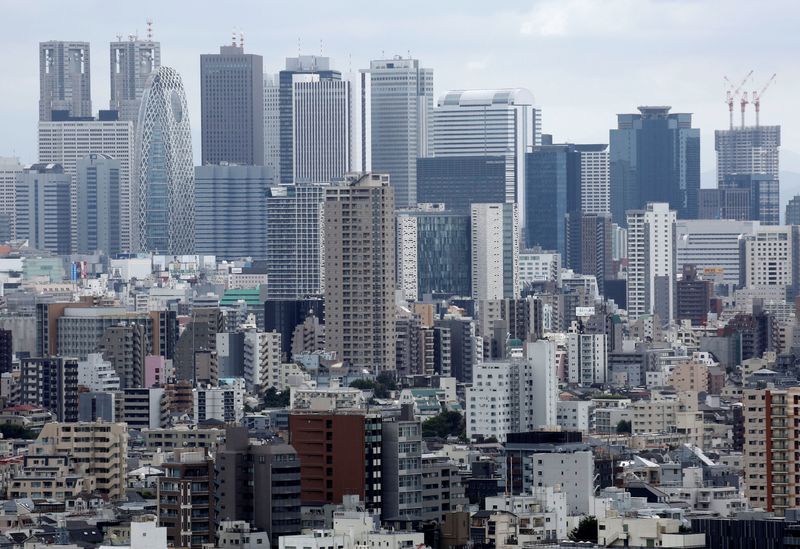By Junko Fujita and Miho Uranaka
TOKYO, Sep 1 (Reuters) - A new wave of big private equity players including KKR & Co (NYSE:KKR) is moving in on Japan's property market, drawn by attractive yield spreads with Japan's low interest rates and by prospective deals with companies that hold under-utilised assets.
Property investors worldwide are flush with cash and emboldened by stablising vacancy rates and rents after disruption by the pandemic, and some are setting their sights on the buildings, real estate subsidiaries and other property assets cluttering up Japanese companies' balance sheets.
"The Japanese market presents a huge opportunity," David Cheong, managing director at KKR, told Reuters. He noted wide scope to help corporations bolster their property-related operations and boost returns on property assets.
KKR's Japan investments have for years focused on acquiring companies, but in March it signalled a move into the local property market when it announced a 230 billion yen ($1.66 billion) acquisition of a Japanese real estate asset manager.
Now it has four people dedicated to Japanese real estate and is hiring more to hunt for deals in hotels, office buildings and multi-family apartment buildings, Cheong said.
Hong Kong-based Baring Private Equity Asia has also positioned Japan as a top priority, said Atsushi Takeiri, head of Japan real estate. He joined the firm last November from Fortress Investment Group, which along with Blackstone (NYSE:BX) Inc has already built a thriving property investment business in Japan.
A key attraction for new private equity entrants is the standout returns Tokyo's office market has delivered so far this year.
Tokyo's yield spread for high-end office towers in prime locations, measured as the gap between the cap rate - or average return - and benchmark borrowing rates, was 2.063% in the first quarter, higher than the spreads in New York, London, or any other major Asian city, according to CBRE, a property research firm and broker.
This reflects Japan's persistently low interest rates, as the Bank of Japan sticks with its ultra-easy money policy while other central banks raise rates to fight inflation. Tokyo's cap rate, on the other hand, is expected to ease to 2.3% by the end of this year from 2.4% in 2021, according to data from Jones Lang Lasalle (NYSE:JLL), a brokerage and research firm.
(Graphic: Office yield spreads favour Tokyo- https://fingfx.thomsonreuters.com/gfx/mkt/jnvwenqlrvw/6Ofkc-office-yield-spreads-favour-tokyo.png)
In 2013, when former premier Shinzo Abe's aggressive "Abenomics" stimulus policy sparked a turnaround in Japan's property market from the great financial crisis and a recovery in foreign investment, the cap rate was 3.7%.
Compared with 2013, however, global property funds now have plenty of cash on hand - around $384 billion in the first half of this year, more than double what they had in all of 2013 – bolstered by aggressive fundraising in the aftermath of the pandemic, JLL said.
Property investors are also catching on to opportunities to improve returns on the extensive property holdings in corporate Japan, which faces mounting pressure to improve governance and shareholder returns. Two high-profile deals last year in particular grabbed their attention: Advertising giant Dentsu Group Inc sold its Tokyo headquarters to a group led by developer Hulic Co for what local media reported at around 300 billion yen, while shipper Nippon Yusen sold 51% of its property unit for an undisclosed sum.
"Many Japanese companies traditionally own real estate assets but often their potential is not fully realised, as they are managed by non-professionals," said Man Kinoshita, head of the Japan real estate business at Goldman Sachs Group (NYSE:GS).
Goldman bought more than 180 billion yen of real estate assets in the first half of this year, on course to exceed last year's 270 billion yen and its heftiest commitment to Japanese property investment since the great financial crisis.

Those include some corporate headquarters that it has leased back to the companies, as well as logistics and data centres, Kinoshita said. Despite the optimism, overall deal flow remains relatively slow, and there is a risk it may not pick up to meet investors' expectations.
The value of real estate deals in Japan in the first half of this year, at 1.41 trillion yen, is down 23% from a year ago, according to JLL data, although this largely reflects the hefty Dentsu deal. As a result, there's a lot of money to chase deals that do come up, which can pressure yields, said Takeshi Akagi, head of research at JLL. "Investment demand is strong but the number of properties for sale is relatively limited," he said. ($1 = 138.5100 yen)